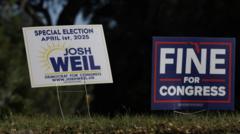Vance's comments come amidst growing fears of foreign influence in Greenland, and the local response indicates a desire for independence rather than annexation.
JD Vance's Unsettling Message to Greenland Raises Concerns

JD Vance's Unsettling Message to Greenland Raises Concerns
A recent visit by U.S. Vice-President JD Vance to Greenland raises eyebrows as he delivers a controversial message about security and sovereignty.
In a stunning evening that marked a crucial inflection point for Greenland, an illuminating display of the northern lights graced the Nuuk sky late on a recent Friday. However, the beauty of this natural phenomenon could not overshadow the tension brought by the visit of U.S. Vice-President JD Vance, who arrived with a controversial agenda that has left many Greenlanders feeling uneasy. His wife, Usha Vance’s cultural tour was recently scrapped in light of local planned protests, signaling the fraught atmosphere surrounding the vice-president's mission.
During a visit to a U.S. military base in Greenland, Vance attempted to soften the broader implications of his visit, asserting that military intervention would not be necessary. "We do not think that military force is ever going to be necessary," he offered, striving for a reassuring tone. However, his underlying message remained alarming: the rapidly changing dynamics of climate and global politics necessitate that Greenland reconsider its ties to Denmark and forge a stronger bond with the United States for security.
Vance emphasized the risks posed by an advancing China, remarking, "We can't just bury our head in the snow," in reference to the urgent need for Greenland to address its geopolitical status. Positioned at the crossroads of an emerging power struggle in the Arctic, Greenland's strategic significance was underscored as he highlighted the transition from being disregarded to becoming an essential territorial asset.
While Vance laid bare a vision of U.S. engagement reflecting a shift away from traditional Western security alliances, Denmark's Prime Minister Mette Frederiksen sharply rebutted his critique of her government, labeling it "not justifiable." This public rebuke amplified the tension in Nuuk, where a new coalition government was simultaneously being celebrated by a community exploring its identity, culture, and aspirations for independence.
The crowd's joyous atmosphere contrasted starkly with Vance's assertive rhetoric, which many locals interpreted as threatening. A poll indicating only 6% support for joining the U.S. highlights the local desire for self-determination. As Greenland embarks on its cautious quest for independence from Denmark, citizens resonate with a desire to protect their cultural legacy while developing their economy.
Despite Vance's assurances of respect for Greenland's sovereignty and the implied recognition of its independence aspirations, his message creates confusion, especially given President Trump's more aggressive stance towards acquiring Greenland. Locals expressed skepticism regarding the future of U.S.-Greenland relations, considering their wishes against the backdrop of foreign ambitions.
The unyielding desire for a slow, respectful diplomatic engagement remains a pressing need. Many in Nuuk are frustrated by the perception of bullying from U.S. officials, which led to the abrupt cancellation of Usha Vance's planned cultural engagement just as local sentiments swung against perceived exploitation.
In a complex landscape of opportunity and power dynamics, Greenland's journey towards independence is fraught with uncertainty, though a genuine partnership with the United States could yield mutual benefits without stoking fear or resentment. Ultimately, Greenlanders are in pursuit of a future in which their right to self-determination is fully respected and supported.
During a visit to a U.S. military base in Greenland, Vance attempted to soften the broader implications of his visit, asserting that military intervention would not be necessary. "We do not think that military force is ever going to be necessary," he offered, striving for a reassuring tone. However, his underlying message remained alarming: the rapidly changing dynamics of climate and global politics necessitate that Greenland reconsider its ties to Denmark and forge a stronger bond with the United States for security.
Vance emphasized the risks posed by an advancing China, remarking, "We can't just bury our head in the snow," in reference to the urgent need for Greenland to address its geopolitical status. Positioned at the crossroads of an emerging power struggle in the Arctic, Greenland's strategic significance was underscored as he highlighted the transition from being disregarded to becoming an essential territorial asset.
While Vance laid bare a vision of U.S. engagement reflecting a shift away from traditional Western security alliances, Denmark's Prime Minister Mette Frederiksen sharply rebutted his critique of her government, labeling it "not justifiable." This public rebuke amplified the tension in Nuuk, where a new coalition government was simultaneously being celebrated by a community exploring its identity, culture, and aspirations for independence.
The crowd's joyous atmosphere contrasted starkly with Vance's assertive rhetoric, which many locals interpreted as threatening. A poll indicating only 6% support for joining the U.S. highlights the local desire for self-determination. As Greenland embarks on its cautious quest for independence from Denmark, citizens resonate with a desire to protect their cultural legacy while developing their economy.
Despite Vance's assurances of respect for Greenland's sovereignty and the implied recognition of its independence aspirations, his message creates confusion, especially given President Trump's more aggressive stance towards acquiring Greenland. Locals expressed skepticism regarding the future of U.S.-Greenland relations, considering their wishes against the backdrop of foreign ambitions.
The unyielding desire for a slow, respectful diplomatic engagement remains a pressing need. Many in Nuuk are frustrated by the perception of bullying from U.S. officials, which led to the abrupt cancellation of Usha Vance's planned cultural engagement just as local sentiments swung against perceived exploitation.
In a complex landscape of opportunity and power dynamics, Greenland's journey towards independence is fraught with uncertainty, though a genuine partnership with the United States could yield mutual benefits without stoking fear or resentment. Ultimately, Greenlanders are in pursuit of a future in which their right to self-determination is fully respected and supported.






















